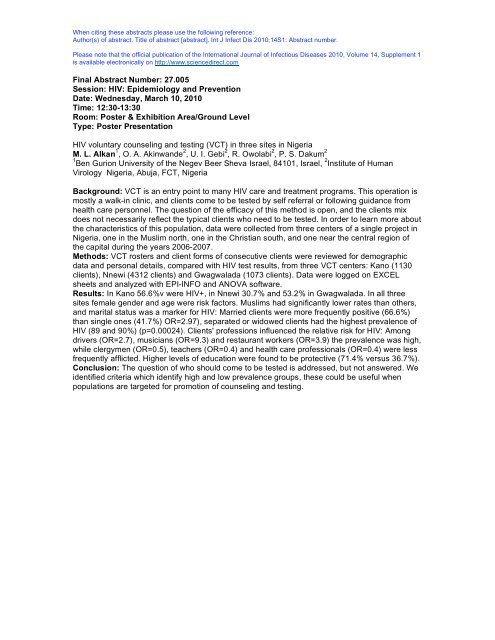14th ICID - Poster Abstracts - International Society for Infectious ...
14th ICID - Poster Abstracts - International Society for Infectious ...
14th ICID - Poster Abstracts - International Society for Infectious ...
You also want an ePaper? Increase the reach of your titles
YUMPU automatically turns print PDFs into web optimized ePapers that Google loves.
When citing these abstracts please use the following reference:<br />
Author(s) of abstract. Title of abstract [abstract]. Int J Infect Dis 2010;14S1: Abstract number.<br />
Please note that the official publication of the <strong>International</strong> Journal of <strong>Infectious</strong> Diseases 2010, Volume 14, Supplement 1<br />
is available electronically on http://www.sciencedirect.com<br />
Final Abstract Number: 27.005<br />
Session: HIV: Epidemiology and Prevention<br />
Date: Wednesday, March 10, 2010<br />
Time: 12:30-13:30<br />
Room: <strong>Poster</strong> & Exhibition Area/Ground Level<br />
Type: <strong>Poster</strong> Presentation<br />
HIV voluntary counseling and testing (VCT) in three sites in Nigeria<br />
M. L. Alkan 1 , O. A. Akinwande 2 , U. I. Gebi 2 , R. Owolabi 2 , P. S. Dakum 2<br />
1 Ben Gurion University of the Negev Beer Sheva Israel, 84101, Israel, 2 Institute of Human<br />
Virology Nigeria, Abuja, FCT, Nigeria<br />
Background: VCT is an entry point to many HIV care and treatment programs. This operation is<br />
mostly a walk-in clinic, and clients come to be tested by self referral or following guidance from<br />
health care personnel. The question of the efficacy of this method is open, and the clients mix<br />
does not necessarily reflect the typical clients who need to be tested. In order to learn more about<br />
the characteristics of this population, data were collected from three centers of a single project in<br />
Nigeria, one in the Muslim north, one in the Christian south, and one near the central region of<br />
the capital during the years 2006-2007.<br />
Methods: VCT rosters and client <strong>for</strong>ms of consecutive clients were reviewed <strong>for</strong> demographic<br />
data and personal details, compared with HIV test results, from three VCT centers: Kano (1130<br />
clients), Nnewi (4312 clients) and Gwagwalada (1073 clients). Data were logged on EXCEL<br />
sheets and analyzed with EPI-INFO and ANOVA software.<br />
Results: In Kano 56.6%v were HIV+, in Nnewi 30.7% and 53.2% in Gwagwalada. In all three<br />
sites female gender and age were risk factors. Muslims had significantly lower rates than others,<br />
and marital status was a marker <strong>for</strong> HIV: Married clients were more frequently positive (66.6%)<br />
than single ones (41.7%) OR=2.97), separated or widowed clients had the highest prevalence of<br />
HIV (89 and 90%) (p=0.00024). Clients' professions influenced the relative risk <strong>for</strong> HIV: Among<br />
drivers (OR=2.7), musicians (OR=9.3) and restaurant workers (OR=3.9) the prevalence was high,<br />
while clergymen (OR=0.5), teachers (OR=0.4) and health care professionals (OR=0.4) were less<br />
frequently afflicted. Higher levels of education were found to be protective (71.4% versus 36.7%).<br />
Conclusion: The question of who should come to be tested is addressed, but not answered. We<br />
identified criteria which identify high and low prevalence groups, these could be useful when<br />
populations are targeted <strong>for</strong> promotion of counseling and testing.
















